#shakespeare meta
Text
I feel so bad for everyone who decided to read the Iliad after reading Plato, Shakespeare or Madeline Miller because... they lied to yall lol
#the iliad#trojan war#iliad#epic cycle#plato#live from platos cave#the symposium#tagamemnon#shakespeare#william shakespeare#willy shakes#shakespeare meta#shakespeare aesthetic#troilus and cressida#madeline miller#achilles and patroclus#the song of achilles#the illiad#achilles#patroclus
42 notes
·
View notes
Text
Stop Confusing Shakespearean Tragedy With Greek Tragedy: Or, Tragedy of Circumstance vs. Character
So this mini analysis/rant was brought to you by that Harley Granville-Barker quote (via John Green) about R&J being a tragedy of “youth as youth sees it.” Not only is this reductive but also the quote just…exemplifies the struggle of academics to categorize Shakespeare’s mid-90s tragedies. Not just R&J but Hamlet and even Macbeth as well (with Othello roped in sometimes as a 🤷♂️). After all, in these plays there is usually not one Big Tragic Flaw (Macbeth sometimes gets a pass for Ambition) that undoes the tragic protagonist and leads them to their utter ruin. These characters’s flaws are instead just part-and-parcel with their humanity.
So a lot of the time academics just do a little awkward side-step and say “Weeeell, the tragic protagonists in these things are young, even the Macbeths, soooooo Tragedy of Youth(tm) maybe??” but that of course is just academic weak sauce, no true spice at all. The fact that these protagonists are young is necessary to the worldbuilding plausibility, not the tragedy. As we have seen before, an older R&J and Hamlet and even Macbeth have been done before and were in fact the norm until very recently. It’s just much more plausible to their characters and their situation (that of relative powerlessness) if they are indeed young than if they were older.
However, their tragedies are not due to youth or even character frailty so much as circumstance. Unlike King Lear, Othello, and Coriolanus, Macbeth, Hamlet, and R&J’s tragedies are ultimately very situational.
What Is Tragedy?
Tragedy in the Greco-Roman tradition stems from harmatia, a character flaw that leads to the tragic protagonist’s undoing. This is usually the definition academics have when gauging Shakespearean Tragedy, even though Shakespeare had a vastly different take on tragedy.
In Greek tragedy, the Tragic Protagonist’s fate was written in the stars, unmovable and unshakable no matter what the tragic protagonist does (see: Oedipus Rex). The TP cannot escape fate, no matter what he tries.
By contrast, Shakespearean tragedy is never fully inevitable. It can always, at some level, be preventable. However, given the situation or circumstances in which the tragic events occur, as well as the tragic protagonists, the tragedy becomes inevitable from a certain point onwards—the inciting event.
This is true for both forms of Shakespearean tragedy, character and circumstance. That said, Shakespeare’s character tragedy is usually the most unyielding of them all, since it hedges more closely to the Greek model. With King Lear’s machismo and temper, Coriolanus’s military fascism, and Othello’s honor armor, the situation in which their tragedies unfold does not matter much, ultimately. You gain an understanding that this tragedy would have happened much earlier or much later and more or less along these same lines. These characters are too set in their ways to change and would have reacted in very similar ways in similar situations.
Not so for R&J, Hamlet, and Macbeth. Their tragedies are much more dependent on their circumstances and their world (particularly re: patriarchy and hierarchy) than anything else. Without that context, I think it’s clear these people would never have done what they did.
Both R&J, Hamlet, and Macbeth are flawed characters, but their flaws are not inherently tragic ones. Rather, their flaws stem from ordinary human emotions and desires that pretty much everyone has. R&J are young and in love and want to be together; Hamlet is a sensitive intellectual mourning his beloved father, with zero tolerance for BS, including Murderous Uncle BS; Macbeth hopes to move up in the world and secure a better position for him and his wife.
When Character Does Matter: Tragic Protagonists Must GAF
This is not to say character doesn’t matter completely in these Tragedies of Circumstance. On the contrary, they very much do.
Because no matter how much of a clusterfuck the tragic situation or circumstance, there is no tragedy if the tragic protagonist simply…well, DNGAF.
For instance, if Hamlet just decided to 🤷♂️, shut his mouth, and keep his head down and accept Claudius as true ruler because, well, what can he do…then most likely there would have been no tragedy for him. He is the prince of Denmark, after all. Claudius and Gertrude are shown to be content at the merest show of compliance. Even if Denmark’s moral and legal corruption would have doomed them, even if Fortinbras were successful in this timeline, it would not have been Hamlet’s tragedy alone.
If R&J had truly been the lusty fiends Internet clowns constantly claim they are, concerned only with getting themselves good and properly laid, then they would not have gone as far as they did with their ~concupiscence. Both their passivity and obedience would have been inertia enough and they would have chosen not to rock the boat. Hell, it must likely wouldn’t have even gotten to that point. Fuckboy!Romeo would have tried to persuade Juliet to give it up without marriage and fuckgirl!Juliet would have let him. At worst they would have eloped and fucked off out of Verona—and hence, no tragedy. And if they were indeed more invested in the feud, then any love relationship would truly have been out of the question.
And if Macbeth had not met the witches, had not truly not had cared for climbing rank, or just DNGAF about his wife acting as the man of the house, then killing Duncan and usurping him would not have proven to be an allure. He would simply continue serving Duncan or the next ruler.
But of course, that isn’t possible. Why? Because then the personalities of these Tragic Protagonists would be completely different—much less sympathetic, to be sure. Who would care about a Danish prince who ignores a truly serious miscarriage of justice? Who would care about the fate of two selfish Italian lovers? Who would respect a Scottish sycophant who bends the knee at whoever is in charge? Not to mention that there just simply wouldn’t be a plot to begin with and the story would be completely changed for the worst.
It just isn’t in Hamlet’s character not to care about his father’s murder. It just isn’t in R&J’s characters to suddenly start caring about the feud and stay away from their love. And it just isn’t in Macbeth’s character not to succumb to the pressures of masculinity, as his culture demands he be.
Tragic protagonists do not have to be sympathetic or likable, although their plight usually is. But Tragedies of Circumstance almost universally call for sympathetic protagonists who would react as most people would in their situation. Nobody would react with indifference at learning their beloved father has been murdered. Nobody would consider giving up a promising relationship for a violent and senseless feud. And if tempted enough, anyone would risk doing something unethical and immoral to get ahead.
Summing Up
Shakespeare obviously had a very different idea of tragedy than the Greeks—precisely because he was responding to the Greek model in the first place while he was adapting the source materials for his plays. And indeed, the very act of adaptation would prompt taking a different approach, however slight.
So if his early tragedies don’t seem as inevitable as they are until after a certain turning point (Tybalt’s death, Polonius’s death, Duncan’s death)…that’s the point. Tragedy is never fully inevitable in Shakespeare because almost nothing about our world and society is. We literally just made it up. Men must be tough and never cry and if someone insults them they must fight them even risking their lives? Made up BS. Women must be quiet and obedient and never have sex outside of marriage or else they’ll be tainted? Made up BS. And all of that BS obscures what human beings really are and what they truly want. And ultimately, that’s what all these tragedies boil down to.
#romeo and juliet#macbeth#hamlet#shakespeare#william shakespeare#shakespearean tragedy#sometimes i sleep but other times i choose violence#er my form of violence#shakespeare meta#rj meta#r&j meta#hamlet meta
87 notes
·
View notes
Text
Okay, but imagine
A production of Romeo & Juliet that’s staged so the Capulet and Montague parents deliver the opening monologue.
Only they aren’t in their costumes yet. They’re just random actors on the stage. Then in the final scene, the surviving parents step onstage in their prologue costumes, and for audience members who haven’t recognized the actors or voices yet, it suddenly clicks into place that the opening monologue was delivered in past tense...because the characters delivered it in hindsight.
The monologue takes the form of a sonnet shared by the speakers, same as Romeo and Juliet’s first conversation:
From forth the fatal loins of these two foes
A pair of star-cross’d lovers take their life;
Whose misadventur’d piteous overthrows
Doth with their death bury their parents’ strife.
These are the survivors who outlived their children and successors. Lady Montague is dead. Lord and Lady Capulet will have no other child. The speakers know the full weight of their failures when they say:
And the continuance of their parents’ rage,
Which, but their children’s end, nought could remove.
Only now do they realize their households were “both alike in dignity.” Only now do they realize they could have gone a different way, but in reality, only the deaths of their children made them reflect on their accountability.
The chorus opens the play apologizing to the audience, “Where here shall miss, our toil shall strive to mend.” This line is taken to mean: This will all make sense when you watch the show. But in this new context, the play is their toil, their plea, their punishment--more than the statues they vow to raise at the end. A living statue, but unlike in The Winter’s Tale, there is no miracle reconciliation.
Now they must watch the curtain rise and their children fall over and over again.
#some shall be pardon'd and some punished#romeo and juliet#romeo & juliet#shakespeare#shakespeare meta
5 notes
·
View notes
Text
No Nightingales (a Clue!)
Um.
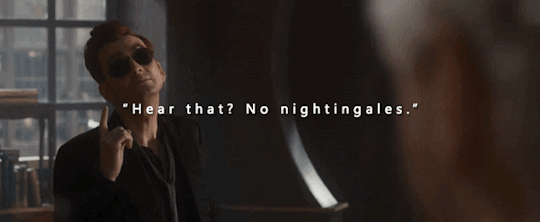
I don't know why it took me THIS LONG to remember that this line is from Romeo & Juliet.
ROMEO: It was the lark, the herald of the morn,
No nightingale. Look, love, what envious streaks
Do lace the severing clouds in yonder east.
Night's candles are burnt out, and jocund day
Stands tiptoe on the misty mountain-tops.
I must be gone and live, or stay and die.
Can I please just draw your attention to the last line, please?
I must be gone and live, or stay and die.
Romeo is telling Juliet that he has to leave now before he is discovered and they are forced apart/he is killed.
Hmm, sounds suspicious to me...
They've been talking in coded messages since... well, always. No nightingales means Crowley is trying to tell Aziraphale that has to go, he's trying to tell him that it's dangerous - but what's promising about this is that if he's speaking in code, Crowley knows they're being watched.
I still can't say for sure what's going on at the end of the Final Fifteen, but I do believe this is a Clue.
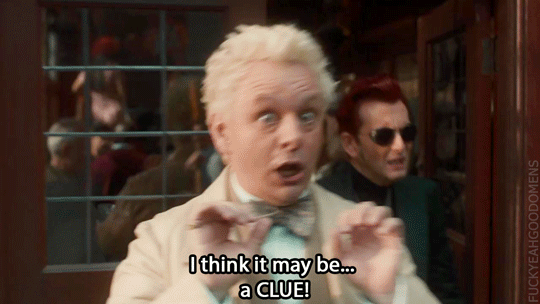
#good omens meta#good omens thoughts#crowley#no nightingales#romeo and juliet#good omens#ineffable husbands#aziracrow#good omens fandom#neil gaiman#shakespeare#ineffable divorce#final fifteen
428 notes
·
View notes
Text
Why Aziraphale is an unreliable narrator
Part 2: The Story of wee Morag
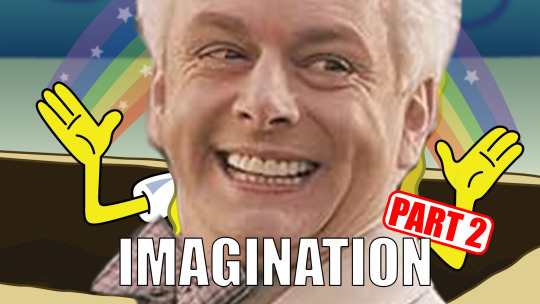
This is Part 2 of 3 total metas. Here are:
Part 1, in case you want to read about my analysis of the Story of Job first
and Part 3, in case you're impatient and want to jump ahead.
Fair warning though, for the sake of understanding some of the references, you're probably better off reading this chaptered meta chronologically. However, every part should work just as well as a standalone! I'll do my very best to make it so.
Alright, off or on you go beyond the cutty cut!
I'll start this second part off with a very brief summary of the main take aways and points from Part 1, which go as such:
Memory, as opposed to a third party's narration, is not a factual, objective retelling of a story or event. It's mingled and mangled with emotions, imaginations and exaggerations, projecting both the feelings and impressions you had back then as well as those you might have now in the present time back on whatever it is you are remembering. (Which is why we need to put everything that Aziraphale is remembering into the context of what he might have felt in the past, as well as what he's feeling right now.)
While this doesn't mean his (or anyone's) memories are lies, it does mean they're a very subjective and sometimes factually distorted representation of what actually happened, which, in our case, gives us a lot of subtext and a lot of not-there furniture to figure out and look at.
So, let's continue with S2E3 and the Story of wee Morag. We start our flashback with a scene of Aziraphale writing his diary entry on the 10th of November, 1827. Immediately, it's firmly established that this is once again not an outside-point-of-view narration, but rather what Aziraphale remembers and wrote down.
One thing that immediately stuck out to me here, is how helpful and kind Crowley is to Elspeth, pretty much from the very beginning when they meet her in the graveyard. Not only does he take on a Scottish accent so she won't perceive him as English (as she does with Aziraphale), but he also helps her drag the barrel that has the fresh body in it and, in the end, even pulls it all by himself while Elspeth simply follows behind them. Here's a rather poor-quality picture, for reference:
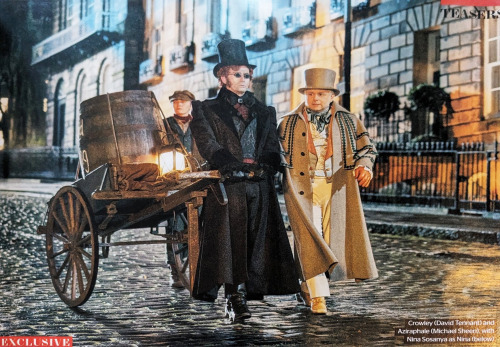
Now, we know that despite not showing it very often, Crowley has always been very fond of the humans and never really put himself on a pedestal simply because he's an immortal being himself. He likes humans, just like Aziraphale does. But, just like this story will tell us, Crowley knows that on top of liking humans, you can't just put them into boxes of good and evil and expect them to always do what is supposedly the "right" or "divinely good" thing to do. (Which is what differentiates him from Aziraphale in the way he understands and treats them, as we're shown in this minisode).
Him immediately and unspokenly helping Elspeth with dragging the barrel therefore might also be a first sign of a tiny projection from present day Aziraphale, as opposed to what Crowley might have actually done (probably just walked beside her, like Aziraphale) because he has the knowledge that Crowley really was so very kind to her in the end, wasn't he? And that he's kind to humans in general. ("Not kind! Off my head on Laudanum!" Sure, babe.)
Most of this minisode, in my opinion, is actually there to establish how Aziraphale's view of morality and good vs. evil used to be quite flawed and elitist –– and how Crowley has always been there to gently nudge him towards questioning his black and white view of heavenly right and hellishly wrong. That's why I think there's not as many hints in this minisode about Aziraphale's memories not being an accurate portrayal of what happened, as there are in the Story of Job or the magic show in 1941. (And, fear not, the latter will definitely be the most hint-heavy one). Alas, there's still a few bits and bobs in the Story of wee Morag that stuck out to me, that make a brief yet good case of the whole unreliable narration thing.
First of all: The way Aziraphale describes all of it in his diary is so different from the way we see him actually remembering it. It's almost like he tried to write this entry (and possibly all of his diary) as a bit of a thrilling short story, with himself as the main character. Which makes sense, given the fact that he adores books and would certainly be keen on dabbling in the art of capital-w Writing himself. It's yet again hinting at the fact that sometimes people (and angels) try to polish and bedazzle stories (and memories) to make them seem more exciting and adventurous, often to distract from the not-so-fun parts of it.
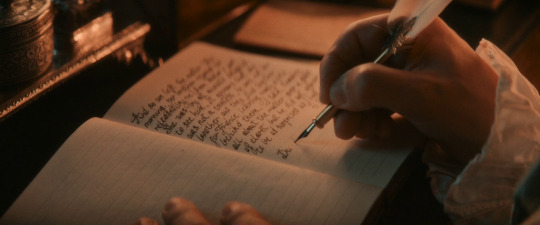
Like when Aziraphale's diary narrates:
"It was with heavy heart we arrived at Elspeth's destination. I was determined to thwart her monstrous plan!"
... and yet we see Crowley and Elspeth casually walking down the alleyway, very obviously not heavy-hearted in the slightest, while Aziraphale nervously scurries on behind them, very obviously not determined to thwart. (Timestamp-wise, it's around 17:38 in S2E3, in case you want to see for yourself.)
We get another cinematographic/auditory hint at the fact that Aziraphale's memory is heavily influenced by what he's feeling that very moment, when Dr. Mister Dalrymple –– FRCSE, thank you very much –– shows him the tumor he removed from the seven year old boy. You can see the shock and horror on Aziraphale's face once he learns of this child's cruel fate. We then proceed to hear Mr. Dalrymple's voice grow sort of echo-y and far away as the sad music swells up and drowns out his voice almost completely. It's awfully similar to what it feels like when really horrible news are broken to you and you dissociate and drift into a state of shock. Here's the clip of it, so you may listen for yourself:
It's clear that this is a very subjective portrayal of what Aziraphale is going through during this part of the memory. He's deeply horrified and saddened about the little boy having passed away so early in life – and we hear and feel this shock with him. Through him, because this is his memory. Whatever it is he's feeling and thinking, we're feeling and thinking it too because we're seeing it through his lense.
Another (less sad) hint at a possible exaggeration is the abnormally deep hole Crowley makes the two graveyard watch keepers fall into. I'm pretty sure he's very much in charge of his miracles, making this random slip-up seem a little silly – which is why I'm also pretty sure the "Might have slightly overdone it on that hole" is a wee bit of a meta hint at this just being another one of Aziraphale's dramatic bedazzlements of this story. For the *flings feather boa around neck* drama!
You know what else might be exaggerated? Hm, I dunno, maybe Crowley growing into the size of a tree for no apparent reason. Sure, yes, he's pretty high on Laudanum which is making him a bit loopy. But apart from that, it does seem an awfully big cinematographic euphemism for him being the metaphorical (and, once again, for the drama of it) literal bigger person in this scenario. He's the one who ends up saving Elspeth and who manages to secure a safe life without poverty and grave robbing for her. While Aziraphale was so tangled up in his own moral journey and main character-ism, missing that wee Morag was seconds away from death already, Crowley is the one who actually ends up growing stepping up for the human in need and saving them for good (pun intended).
In a way, it might just be Aziraphale's view of/feelings for Crowley in this very moment. Watching the demon outgrow what, according to Aziraphale's heavenly logic, is supposed to be a foul fiend, bestowing evil upon humanity – and growing into someone who does the exact opposite and saves Elspeth instead. Another larger-than-life character development, in Aziraphale's eyes. Literally.
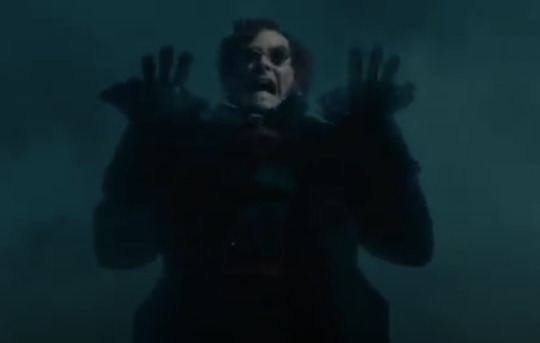
Let's switch back to the topic of the diary entry one last time, so I can make my final point of the this minisode's unreliable and a smidge over-dramatic narration of Dr. McFell. If you pay close attention, Aziraphale starts the entry we're all getting to experience with: "Last month, Crowley and I both happened to be in Edinburgh." Which means it didn't actually happen on the 10th of November, but rather at some point in October, 1827. Once we see Crowley get hydro-pumped back to Hell after rescuing Elspeth, the minisode ends with, presumably, the last sentence of Aziraphale's diary entry: "And that was the last I would see of Crowley for quite some time."
Take my hand and let's look at where the furniture isn't: This very clearly means that Crowley couldn't have been gone for more than a month, at best. Read again: "It happened last month and that was the last I would see of him for quite some time." This, albeit indirectly, clearly implies that when Aziraphale had sat down to write the diary entry, he had already run into Crowley again. Otherwise his phrasing would have probably been more along the lines of "... and I haven't seen Crowley since" or "... and Crowley has yet to return from wherever it is Hell's currently keeping him".
What's the point I'm trying to make? Good question. I guess my main point of storyteller Aziraphale being a bit over-dramatic in his narration is simply backed up by this, since A Single Month would barely pass as "quite some time" for an immortal being like him. And yet that's how he puts it, in his little Confidential Journals of A.Z. Fell, Vol. 603.
And another point that has absolutely nothing to do with the topic of this meta (but I'm still gonna make it 'cause this is my memory post): The meeting at St. Jame's Park in 1862 that so many, post-S2, took to be their first run-in after the Story of wee Morag, actually wasn't that at all. They saw each other at least once only a month later, as Aziraphale's diary lets us know. Which explains why he wasn't very surprised or concerned when he met Crowley in London, 1862. If there really had been 35 years in between those two events, the first one ending with Crowley being sucked back Downstairs to receive more than three decades worth of hellish punishment, wouldn't Aziraphale have been at least a tiny bit worried or more interested than:
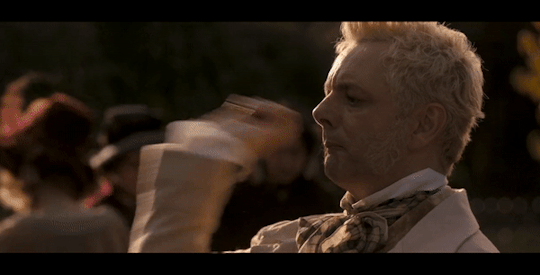
Just saying.
Alright, let's string this inflated hot air balloon of a post back together so we can outline some invisible furniture. This time with only two humble points:
Crowley through Aziraphale's lense
Backed up by how we are introduced to Bildad the Shuhite in the Job minisode (suave, cheeky, smart, passionate in shoemaking and obstetrics), it's growing quite clear that Aziraphale's memories and impressions of Crowley are very fond and impressed ones. He sees him as someone who's not only witty, funny and cool, but also as someone who has figured out way sooner and faster than him that nothing's ever black and white. Not God's plans and not the human's choices either.
Aziraphale as a bit of an exaggerating adventure author
With the direct parallel we get of inkslinger journalist!Aziraphale in the present day, it's quite apparent after this minisode that Aziraphale's memory is not only deeply influenced by his emotions, but that he also tends to have a bit of a dramatic touch to him. Although, you gotta give it to the guy: A month without seeing the love of your life, even if said life is eternal, can indeed seem like "quite some time".
Well, would you lookie here, we've reached the end of Part 2! What a journey it was. I hope you forgive me for the fact that I drifted off-course a few times. I just can't seem to reel in my silly little observations, even if they've got nothing to do with the point I'm trying to make. But hey, doesn't that just make me a little bit like Aziraphale's storytelling, in a way?
I'll let you be the judge of that.
See you in Part 3! And in case you haven't snuck a peak yet: here's Part 1 again.
Ta!
#good omens#good omens season 2#gos2#go2#good omens 2#good omens meta#ineffable husbands#aziraphale#crowley#good omens analysis#aziraphale is a storyteller#but not a very accurate one#story of wee morag#my own meta#aziraphale the Drama Queen#shakespeare who#unreliable but beloved story teller aziraphale
556 notes
·
View notes
Text
idk if it's been talked about before but suzanne collins never misses a BEAT when it came to names, specifically coriolanus snow and dr volumnia gaul. just from their first names alone you can already guess what type of role might play between them (well... if you've read shakespeare's coriolanus that is. i do recommend it btw).
a lot of bits were taken from shakespeare's play for tbosas like the motif with scars / wounds / the body as being a microcosm of the nation, the common people fighting up against the government, coriolanus' hatred of the common people wanting to be "equal" to him, the rebel arc etc etc but i'm soooo so so interested in the fact that dr gaul was named volumnia and coriolanus is coriolanus because in the play, coriolanus' mother's name is volumnia!
volumnia is arguably the only female character in the play that has any depth (i am so sorry virgilia). his mother shapes her son into the warrior he is. she reminds him at every turn that he is nothing more than a weapon to be wielded. in fact, she's the one who gets her son to come back from his "revolt" against rome which ultimately lead to his demise. this parallels tbosas in the same way because dr gaul took coriolanus and molded him into the villain you would see in thg trilogy. she brought him back from d12 and then brought about the end of his humanity (a death, so to speak—at the end of the book he said something similar to this to try to save himself from lucy gray's suspicions but he was right because he did kill a part of himself to be where he is)! coriolanus snow's mother is present but off-page. her ghost haunts him, comforts him, but the 'mother' figure is the ever-present, all-knowing dr gaul.
UGH! like with just their names you could map out where they end up at the end of the story and that's literally insane. like the caliber of writing is literally next to none fr
#lit#the hunger games#the ballad of songbirds and snakes#coriolanus snow#volumnia gaul#meta#text#tais toi lys#thgpost#yet again the mf that fixates on names and shakespeare talks about names and shakespeare what can i say i'm predictable#ALSOOOOOOO. shakespeare's coriolanus' name isn't even coriolanus. it's caius martius but it's only when he helped deafeat corioles that he#earns the name coriolanus. it's a neat parallel that coriolanus didn't really “earn” the snow name until he became a villain.#anyway i'm just spitballing#*
427 notes
·
View notes
Text
Holy Palmers Kiss
Throughout their history together, the romance between Aziraphale and Crowley has mostly been expressed through incredibly subtle ways. It's been centuries (if not millennia) of nothing more obvious than a surreptitious brushing of hands or yearning looks when they think no one is watching. And of course, when they have plenty of deniability.
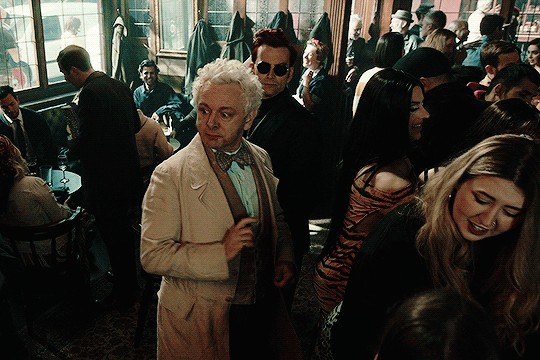
Good work, Aziraphale... hand on the chest of the Thin Dark Duke, and if anyone asked, you were just making sure that young lady didn't get bumped.
And this is for a very good reason. It quite literally isn't safe for them to be openly romantic with one another, even now. Demons like Hastur and Shax are constantly popping up... Michael and Uriel are always watching... eyes are everywhere.
They have certainly gotten closer to being open in the years that separate the two seasons. Crawley sprawls all over that bookshop like he has a personal vendetta against chairs - removes his glasses as soon as he steps foot inside (which is an incredibly coded action that I would love to take a more in depth look at in the future) - gives up the keys to the Bently... And Aziraphale himself has those longing looks - calls him up to talk enough that Crowley knows his "tones of voice" - and then, we get The Ball.
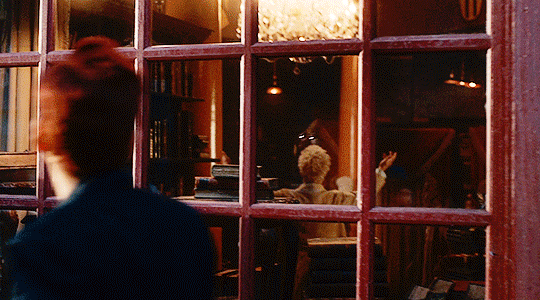
Technically, The Ball is for Nina and Maggie... or at least that's what Aziraphale says. We get the lovely little moment in the pub where he and Crowley try to come up with the best ways to get humans to fall in love with each other. But the moment Aziraphale mentions Jane Austen having characters dancing with each other and realizing how in love they were, I think at least for him the focus changes to this... THE BALL IS FOR CROWLEY. And once he starts giving away books to make sure the ball will be perfect, there can be no question. The entire idea is a way for him to be able to dance with Crowley.

That's why, for me, the most romantic moment in all of Good Omens, at least from Aziraphale's point of view, is this moment right here.
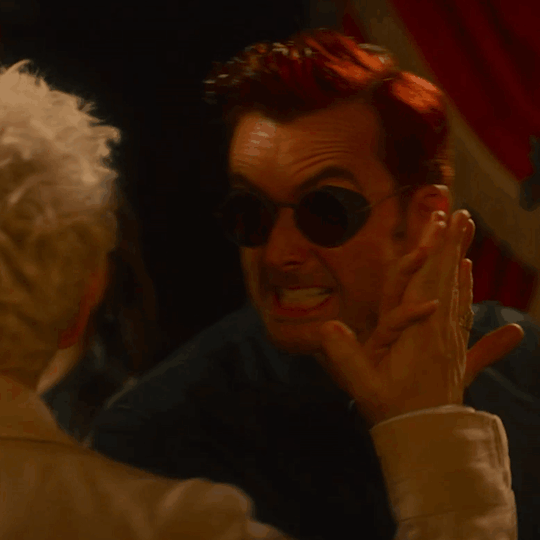
Vavoom! Sorted! Look at the way Crowley even curls his fingers around Aziraphale's hand! This is peak Aziraphale romance as a fan of Jane Austen.
But he's also a fan of Shakespeare. Even the gloomy ones. And every time I watch this scene, I'm reminded of a different ball from one of the gloomy plays that Crowley would hate and Aziraphale would swoon over. Romeo and Juliet. A fitting parallel to an angel and a demon being in love.
In Romeo and Juliet, at the end of the first act, is another ball. Romeo tries to get Juliet to kiss him, and she turns him down with this...
"For saints have hands that pilgrim's hands do touch/ And palm to palm is holy palmer's kiss"
There's quite the back and forth here between Juliet and her Romeo about hands and lips and such, (and eventually Romeo gets his way) but the parallel for Aziraphale in this exchange is unmistakable. He, as the angel, is the saint (and stand in for Juliet), Crowley his pilgrim. Snogging in public would be absolutely out of the question for our dear prim and proper Aziraphale... but this is a chaste kiss, and one that he is showing the world. A public declaration of his love for Crowley. A Holy Palmer's Kiss.

It's certainly debatable if Crowley would have picked up on it. Like a lot of their coded language there are times when one of them misses what the other is trying to say. But in my opinion, this was not only a public declaration, but his confession to Crowley. This is his "I love you" as much as "I forgive you" is.

Just for fun, here's how Romeo finally gets his kisses (but let's have Crowley stand in for Romeo and Aziraphale for Juliet, shall we?)
Cro. Thus from my lips, by yours, my sin is purged. (They kiss)
Azi. Then have my lips the sin that they have took.
Cro. Sin from my lips? O trespass sweetly urged. Give me my sin again. (They kiss again)
#good omens#ineffable husbands#aziraphale#crowley#good omens meta#aziraphale loves crowley#crowley loves aziraphale#good omens 2#the ball was for crowley#aziracrow#shakespeare references in Good Omens
338 notes
·
View notes
Text
Hamlet’s Age
Not to bring up an age-old debate that doesn’t even matter, but I have been thinking recently how interesting Hamlet’s age is both in-text and as meta-text.
To summarize a whole lot of discussion, we basically only have the following clues as to Hamlet’s age:
Hamlet and Horatio are both college students at Wittenberg. In Early Modern/Late Renaissance Europe, noble boys typically began their university education at 14 and usually completed at their Bachelor’s degree by 18 or 19. However, they may have been studying for their Master’s degrees, which was typically awarded by age 25 at the latest. For reference, contemporary Kit Marlowe was a pretty late bloomer who received a bachelor’s degree at 20 and a master’s degree at 23.
Hamlet is AGGRESSIVELY described as a “youth” by many different characters - I believe more than any other male shakespeare character (other than 16yo Romeo). While usage could vary, Shakespeare tended to use “youth” to mean a man in his late teens/very early 20s (actually, he mostly uses it to describe beardless ‘men’ who are actually crossdressing women - likely literally played by young men in their late teens)
King Hamlet is old enough to be grey-haired, but Queen Gertrude is young enough to have additional children (or so Hamlet strongly implies)
Hamlet talks about plucking out the hairs of his beard, so he is old enough to at least theoretically have a beard
In the folio version, the gravedigger says he became a gravedigger the day of Hamlet’s birth, and that he’s be “sixteene here, man and boy, thirty years.” However, it’s unclear if “sixteene” means “sixteen” or “sexton” (ie has he worked here for 16 years but is 30 years old, or has he been sexton there for thirty years?)
Hamlet knew Yorick as a young child, and the gravedigger says Yorick was buried 23 years ago. However, the first quarto version version of Hamlet says “dozen years” instead of “three and twenty.” This suggests the line changed over time. (Or that the bad quarto sucks - I really need to make that post about it, huh…)
Yorick is a skull, and according to the gravedigger’s expertise, he has thus been dead for at least 7-8 years - implying Hamlet is at least ~15yo if he remembers Yorick from his childhood
One important thing sometimes overlooked - Claudius takes the throne at King Hamlet’s death, not Prince Hamlet. That is mostly a commentary on English and French monarchist politics at the time, but it is strange within the internal text. A thirty year old Hamlet presumably would have become the new monarch, not the married-in uncle (unless Gertrude is the vehicle through which the crown passes a la Mary I/Phillip II - certainly food for thought)
Honestly, Hamlet is SO aggressively described as being very young that I’m fairly confident the in-text intention is to have him be around 18-23yo. Placing his age at 30yo simply does not make much sense in the context of his descriptors, his narrative role, and his status as a university student.
However, it doesn’t really matter what the “right” answer is, because the confusion itself is what makes the gravedigger scene so interesting and metatextual. We can basically assume one of the following, given the folio text:
Hamlet really is meant to be 30yo, and that was supposed to surprise or imply something to the contemporary audience that is now lost to us
Older actors were playing Hamlet by the time the folio was written down, and the gravedigger’s description was an in-text justification of the seeming disconnect between age of actor and description of “youth”
Older actors were playing Hamlet by the time the folio was set down, and the gravedigger’s description was an in-text JOKE making fun of the fact that a 30-something year old is playing a high-school aged boy. This makes sense, as the gravedigger is a clown and Hamlet is a play that constantly pokes fun at its own tropes and breaks the fourth wall for its audience
The gravedigger cannot count or remember how old he is, and that’s the joke (this is the most common modern interpretation whenever the line isn’t otherwise played straight). If the clown was, for example, particularly old, those lines would be very funny
Any way you look at it, I believe something is echoing there. It seems like this is one of the many moments in Hamlet where you catch a glimpse of some contemporary in-joke about theater and theater culture* that we can only try to parse out from limited context 430 years later. And honestly, that’s so interesting and cool.
*(My other favorite example of this is when Hamlet asks Polonius about what it was like to play Julius Caesar in an exchange that pokes fun of Polonius’ actor a little. This is clearly an inside-joke directed at Globe regulars - the actor who played Polonius must have also played Julius Caesar in Shakespeare’s play, and been very well reviewed. Hamlet’s joke about Brutus also implies the actor who played Brutus is one of the main cast in Hamlet - possibly even the prince himself, depending on how the line is read).
#hamlet#hamlet meta#hamlet’s age#this obviously does NOT imply anything about being 30yo btw#any age is a good age to be driven to madness by guilt and grief#It’s just very usual for shakespeare to describe somebody well past their apprentice age as a ‘youth’ SO MUCH#and that makes those lines very interesting#shut up e#willy shakes#posting this while EXHAUSTED going to see a million errors and tone problems tomorrow sorry in advance yall#**very unusual#long post#posting Hamlet meta like it’s 2014 hell yeah
821 notes
·
View notes
Text
Nightingales and Romeo and Juliet in Good Omens S2E6
I’ve been thinking about the many symbolisms of the nightingale since the end of S1, but especially since the whole “That’s the point. No nightingales” conversation between Crowley and Aziraphale at the end of S2. Nightingales feature in a lot of literary texts symbolizing a whole bunch of things, but I found this particularly interesting:
In Romeo and Juliet (you know, the play where two star-crossed lovers from rivalling families try to overcome all boundaries in the name of love), there is a scene (Act 3, Scene 5) where Romeo and Juliet have a conversation (or a little row/misunderstanding) about nightingales and larks. It is the night/morning after their secret marriage (!) and Romeo has to leave before the morning comes. Otherwise he will be in great danger as he might get caught by Juliet’s relatives. Juliet, who does not want him to leave yet, argues that the bird that they hear singing outside the window is a nightingale. Since nightingales sing by night, she hopes that this will convince Romeo that it is still night and thus make him stay a bit longer. Romeo, on the other hand, is convinced that it is a lark, a bird of dawn, that is singing, which would mean that he has to leave soon. When Romeo suddenly states that he does not care if he will be killed or not and that he wants to stay with Juliet, Juliet caves in and explains that the bird they hear is actually a lark and that Romeo has to flee.
So, a few things to point out here:
It is the night after their “secret marriage”
The nightingale is a night bird whose song indicates darkness and a world asleep, which protects forbidden love from being found out
Juliet does not want to face the harsh reality of the day approaching, which is why she tries to convince Romeo that they are hearing a nightingale while, in fact, a lark is singing, indicating danger
When her lover unexpectedly declares that he wants to stay with her, even at the risk of losing his own life, she tells the truth in an attempt to usher him out to save his life
Okay, back to Good Omens:
It is the morning after The Dance™ (you know, the one Aziraphale organized only to be able to make a move on Crowley and dance with him; the one during which Crowley tried to open Aziraphale’s eyes to the dangerous situation they were in while Aziraphale refused to give up on his little fantasy-bubble of love and romance). Aziraphale tries to convince Crowley to go back to heaven with him. We don’t know exactly what went on in the conversation between him and the Metatron, but there was probably some threat involved, which means Aziraphale thinks that they will both be safe(r) in heaven. In a way, he is the Juliet in the situation, trying to make his Romeo stay/come with him by convincing him that the nightingale is still singing – that they can still be safe that way. Like the night before, he does not (or at least does not seem to) realize the danger they are in and will be in and that heaven will never let them be “an us”. He does not want to part with Crowley. Crowley, on the other hand, knows exactly that going to heaven is not an option for him and he understands that they are in danger. His statement, “that’s the point. No nightingales,” means that the protection of the metaphorical night, the indifference of heaven and hell concerning their situationship, is over, and that they can either flee together or have to part. Aziraphale, judging by his expression, seems to understand what Crowley is implying here. This seems to be where his parallels with Juliet end, since he does not agree with Crowley in the end. However, there is a version of events that would make his actions similar to Juliet’s in the end: Assuming that Aziraphale knows that one of the two options to keep Crowley safe(r) is out since he knows that Crowley will never agree to going back to heaven, his only other option is to ensure Crowley leaves without him (and without the impression that he needs to save Aziraphale and their relationship). He does this by driving him out if the bookshop.
In any case, the nightingale seems to symbolize the temporary safety of their forbidden love, and Crowley’s statement at the end signals the end of this precious period, and that they must part (for now).
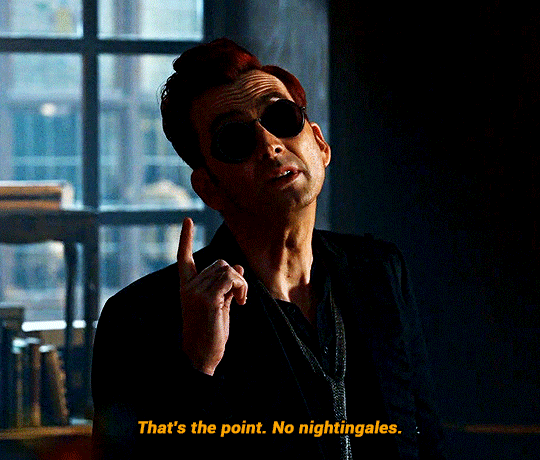

#good omens#good omens s2#aziraphale#crowley#ineffable husbands#good omens meta#crowley x aziraphale#neil gaiman#go2#good omens 2#romeo and juliet#no nightingales#nightingales#thank you neil gaiman#shakespeare
458 notes
·
View notes
Text
damn we really don't think enough about the major world events that crowley and aziraphale have witnessed on both ends. all the horrible things like wars, discrimination, natural disasters, genocide, etc. yes but also all the good: liberation, major political reforms, the invention of new genres and materials and technology and fields of study.
like oh my god. they were there for all the centuries that women had no rights at all and then they got to witness the suffragettes, the women writers and royals and inventors and activists. they got to witness the overturning of anti-lgbtq and racial segregation laws and the celebration of human rights and identities. they were there to witness international tragedies but also the solidarity from everyone all over the world rallying for peace for people they don't even know. they got to see humans create new forms of art and fashion and the printing press and electricity and poetry and and and coloured television and music and they got to see humans constantly find new ways to find connection and love and fun and passion and their own forms of expression.
like imagine being there for everything. how could you not love the world after seeing the fall and rise of humanity over and over again in every way shape and form for six thousand years. holy shit
#fearandhatred#fearandmeta#and they didn't just witness all this they got to KNOW people from all these times. shakespeare and da vinci and jane austen#and just random people on the street or working as doctors or baristas or shopkeepers like how many STORIES have they heard#imagine knowing intimately how the world has existed from the beginning of time#I'M FINE#it's just#like do you get it. do you get it#it's so incomprehensible#it's like in their heads is an incredibly massive and infinite history book with thousands of personal experiences and forgotten dynasties#like is this blowing anyone else's mind rn#i don't think this post is even about good omens anymore#good omens#good omens season 2#ineffable husbands#aziracrow#crowley#aziraphale#good omens meta
177 notes
·
View notes
Text
Shakespeare: Juliet had no pulse no breath
Clowns: Why didn't Romeo just check for a pulse?!?!?!?!?!
Shakespeare: T-T
#i swear to goodness i'll never be over this#leave my boy alone#read the fucking play#shakespeare#william shakespeare#shakespeare meta#willy shakes#shakespeare aesthetic#romeo and juliet#benvolio#friar laurence#juliet#romeo rambles#romeo montague#romeo and juliet aesthetic
10 notes
·
View notes
Text
thing is.
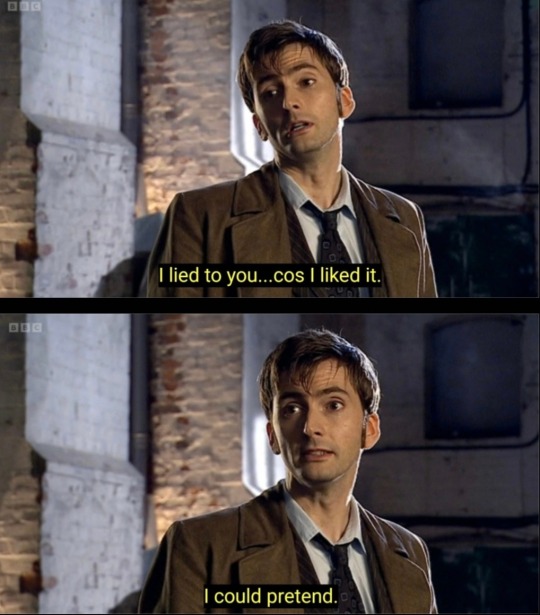
the doctor in series 3 is a lot more complex people give him credit for.
when he gets mad at martha at the end of 'smith and jones' it's not because he's offended at her flirting, annoyed at her insinuations, 'how dare she'. no. he's mad because she sussed him out, right down to the blue suit.
in 'smith and jones' the doctor has a clean slate, he has reinvented himself. and this version has no baggage.
this doctor hasn't got a brown suit it's blue, this doctor is flirtaious, romantic, even does the 'honourable' thing of making sure she knows the kiss he will give her means nothing. she won't get attatched that way when he sacrifices himself to draw out the plasmavore.

but this doctor is also a bit callous, he's excited by the thrill and danger, dimissing very real distress from people around him in favour for the facts. he only pulls himself back upon his conversation with martha.
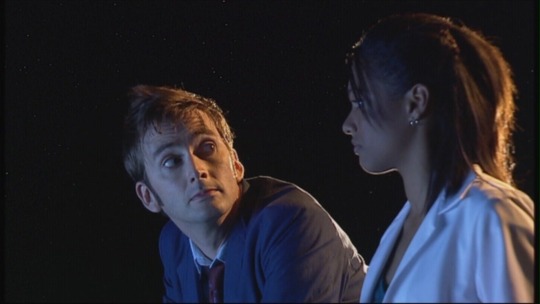
in fact, it's no coincidence the kiss happens after martha commemorates the dead, her old mentor.
the problem is however, martha is too clever, too observant, too confident to completely be won over by this entirely. when he tells her he is the doctor, just the doctor, at first she refuses to call him by this. he has to earn it. sonic screwdriver? lol, got an electric spanner too? she asks if he has help because surely he didn't come to this hospital because he thought something was wrong on his own?
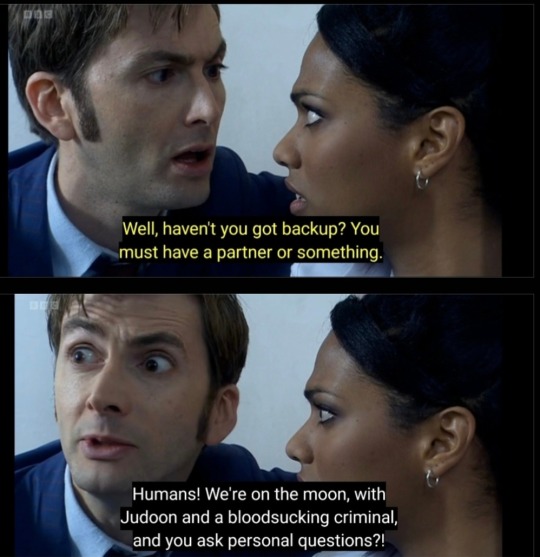
that's why he says stuff like this. he's like why are you poking holes in the illusion. i'm *this* person now, don't take me back to my reality.
but he's not quite done. they both could have died on the moon but she saves his life so, he gets another chance. incomes the reinvented doctor part two. [you can argue the doctor always knew they would make it because martha told him she saw him in a moment that had happened for her but not yet for him.]
so part 2 commences but he's turning it all the way up because he wants her as his companion.
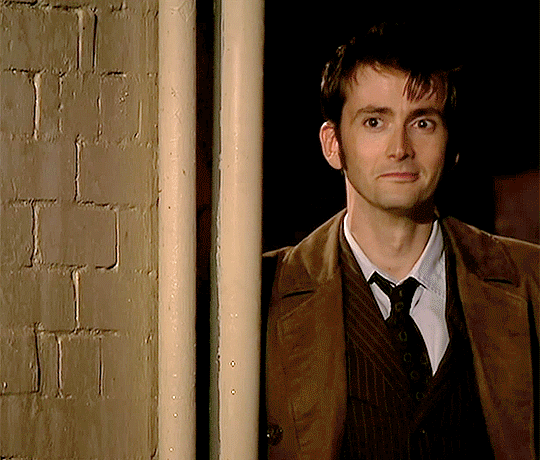
so he's smooth talking her, but even then she's still not letting him get one over on her. "not pompous at all." so better turn it up some more, and he time travels, a 'cheap trick' to impress her more.
until his newly formed version of himself gets a hole poked in once again after martha inadvertantly makes him remember rose. and he clams up, decides it will only be one trip in a pretty aloof, defensive and abrupt way. shuts down any path that could lead to something more, testing to see if she can do the same - "i only go for humans" - she can and away we go. he's racing about the tardis back to semi-normal and they are off.
it's why he's so having mood swings all throughout 'the shakespeare code,' flip flopping between annoyance and dismissal at her questions, she's ruining how it was supposed to go in his head. she wasn't supposed to ask *this* many questions, she was just supposed to be impressed. but she went and reminded me of rose so this can't work now, it's gonna be one trip. but then flipping back to this need to impress and to just fall back into step to how they were, running around and having an adventure. how he's supposed to be.

and he decides i don't want this to end. im extending the trip. but yet again martha pokes another hole - his home. but the doctor holds onto the pretense for as long as he can. he doesn't just say "we can't go to my home and please don't ask me why because it's painful." he just lies. and this pretense now takes on a new form, because it directly references rose with choosing new earth. see, he starts by reminiscing on gallifrey when he describes it to her then chooses someone else to reminisce on. rose. all with little regard to how martha would feel about being used in this way. but unfortunately for the doctor, this takes a dramatic change for the worse as taking martha here directly leads to her abduction.
now, despite martha's olive branch after the death of the face of boe, the doctor still doesn't tell her the truth. until she sits down, and really hones in on his lies and the people of new new york began to sing for the dead. and the doctor looks at martha, the human, listening to the humans commeorate the dead. and tells her the truth. that he lied because he liked it. because he could pretend. pretend that his reality was not true. he was not the last timelord.
intriguingly enough, by the time we get to the lazarus experiment, the doctor seems determined to play out how the story was supposed to go. yet again disregarding martha's feelings. find a new companion. travel for a bit, then bring her home safe and sound. and not one year later. no ties, a nice thanks then goodbye. no heartbreak, no tears. but he comes back. because he doesn't want it to end yet, offers her another trip. and here goes martha again. telling him he needs to be clear in what he wants right now. he's not someone who can just breeze in and out of her life without a second thought. is she his companion or is she a passenger?
and the pretense is over. mostly anyway, and the doctor is at his mlst vulnerable due to the circumstances of '42' and by its end, it's like a refreshed smith and jones.


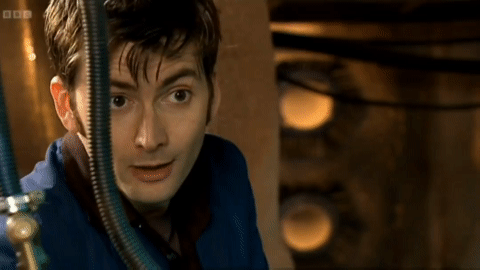
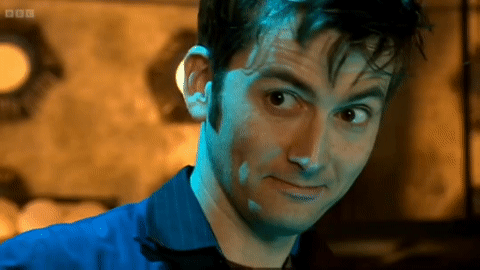
but now he doesn't feel the need to lie, he's not fully there yet. but he's more comfortable, he doesn't need to pretend.
perhaps too comfortable.
#doctor who#martha jones#tenth doctor#10th doctor#tenmartha#smith and jones#the shakespeare code#meta#the lazarus experiment#42#human nature#the family of blood#blink#utopia#the sound of drums#last of the timelords
159 notes
·
View notes
Text
something about the speech hamlet asks the player to act out. what is it about priam and hecuba and pyrrhus, does he cast priam as his father and his mother as hecuba? he wants to see her as unwilling? claudius in pyrrhus' place brutally killing an undefended man. but what of the children? almost all of hecuba and priam's children are dead, does he see himself as one of the dead or is it the fact that cassandra is alive and her perceived madness is what defines her?? we know he believes himself to not be one for action then we must cast him as cassandra, her tireless words begging the world to see the truth and yet being called mad. here hamlet is deliberately stepping into madness, i suppose cassandra did too. i know this isn't really coherent but i am writing at 2:30 am sooo
#hamlet#william shakespeare#shakespeare#hamlet prince of denmark#cassandra of troy#hecuba#priam#tagamemnon#meta#i wanted to talk about this with my prof but i am just a little bit scared so you guys can have it
99 notes
·
View notes
Text
Good Omens season 3 and Shakespeare’s Antony and Cleopatra
S3 speculation
This is my called shot. I see a lot of assumptions for a Persuasion plot but I don’t think we’ll get Austen again.
“Age does not wither nor custom stale his infinite variety.” - Crowley (debatable to whom he is referring)
“Age cannot wither her, nor custom stale her infinite variety.” - Enobarbus (referring to Cleopatra)
For the purpose of this, I will abbreviate Antony and Cleopatra to A and C, and Egypt to E for psychological priming purposes.
A and C are living in E. They’re happy to stay there together with one another. Unfortunately, the leadership in A’s homeland recall him to sit on the ruling council. A regretfully leaves C alone on E.
Back in his homeland, A is forced into a partnership with someone to assure his loyalty since the others in charge are concerned about his loyalty to C. C finds out and is jealous.
A and the others in charge broker an agreement with their main threat but as soon as A’s attention is elsewhere, the others in charge betray the agreement.
A is furious and leaves his homeland to go back to E and his love C. They fight for E together.
Let Rome in Tiber Heaven above melt and the wide arch
Of the ranged empire fall. Here is my space.
Kingdoms are clay. Our dungy earth alike
Feeds beast as man. The nobleness of life
Is to do thus; when such a mutual pair
And such a twain can do ‘t, in which I bind,
On pain of punishment, the world to weet
We stand up peerless.
The plot continues, but Antony and Cleopatra is a tragedy, and Good Omens is a comedy. There are other plot points I think could be incorporated (A believing C has died, C being captured, themes of self-sacrifice and no longer fitting the mold you were made from) but for the basic, general plot, this is where my bet is placed.
#good omens#aziraphale#crowley#brain rot#good omens meta#i spent a normal amount of time on this#best not to speculate#good omens 3#good omens speculation#shakespeare#ineffable husbands#antony and cleopatra
83 notes
·
View notes
Text
Ok but wait the reason Lokis are so interested in theatre & Shakespeare & literature etc (fiction in general) is because their prime variant is the God of Stories 😭
#like!!!#ragnarok loki was obsessed with writing plays!!!#What If loki is obsessed with Shakespeare#loki in 2x6 was quoting TS Eliot#they all have this undercurrent of being drawn to fiction because their main alpha variant#is the god of STORIES !!#I love it#gos loki#Loki#loki finale#loki series#god of stories Loki#mcu Loki#ragnarok loki#thor ragnarok#marvel what if#what if loki#loki meta#mcu
82 notes
·
View notes
Text
In another episode of “Suzanne Collins and Francis Lawrence write essays with faces”
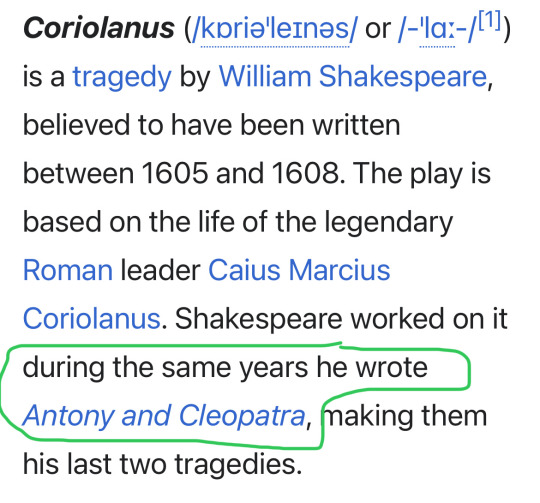
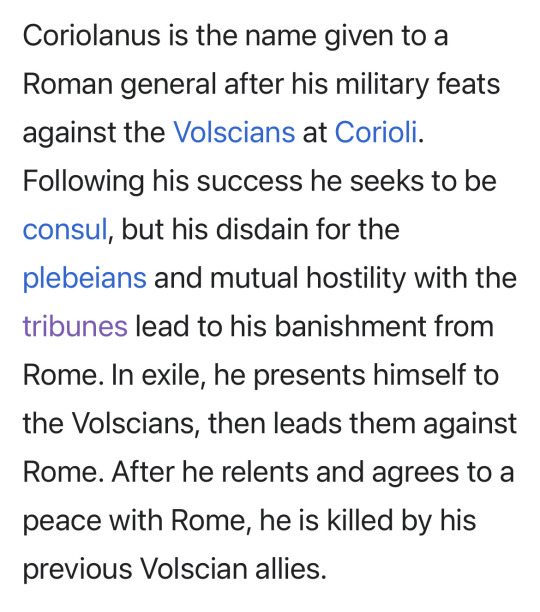
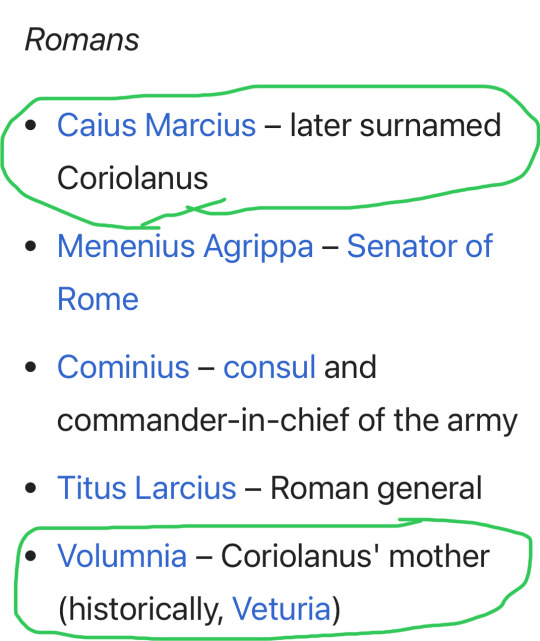
And MORE


#wikipedia#fucking me UP tonight#TBOSAS#ballad of songbirds and snakes#the ballad of songbirds and snakes#suzanne collins#william shakespeare#her Roman Empire IS the Roman Empire#coriolanus snow#sejanus plinth#francis lawrence#the implication that#volumnia gaul#is the spiritual mother of#president snow#WILD#tbosas meta#thg meta
68 notes
·
View notes